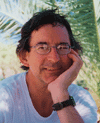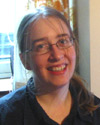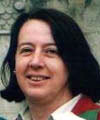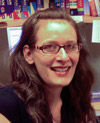 |
 |
 |
 |
 |
 |
| |
||||
|
Contributors |
|||
|
I come from Leeds. I did my first degree at the University of Cambridge, and then a Postgraduate Certificate in Education, during which I quickly abandoned my ambition to teach children in the UK state system. But at the end of that year I got a summer job teaching English as a foreign language to adults, found that I liked it, and I've never looked back. I live in Poland, on the Baltic coast, and work on a freelance basis as a teacher, teacher-trainer, writer and translator. Before Poland, I worked in Germany, Sweden, and for a long time at ILC in Hastings, England. While I was there, I did an MA in TEFL at Reading and around the same time joined IATEFL and started attending the annual conferences. For me, this was an important step towards becoming part of a bigger, international community of teachers, and expanding my horizons beyond the classroom and the day-to-day work of teaching. I was one of the founder members of the IATEFL Pronunciation Special Interest Group, and at the moment I'm its joint coordinator. I've also served on the main IATEFL committee and the publications committee. I'm the author of English Pronunciation in Use — Elementary (CUP), and co-author of the Inside Out Grammar Companions (Macmillan), Inside Teaching (Macmillan), The Pronunciation Book (Longman), and Bridges (Klett) — an adult course for German-speaking learners. I've been a member of the authorial team of two Polish-English dictionaries, I wrote language study articles for Macmillan's Phrasal Verbs Plus and the second edition of the Macmillan English Dictionary, and I'm a contributor to the onestopenglish website. I like studying languages and tracing connections between them, and I'm — still — intrigued by the question: Given that so many people in the world learn foreign and second languages informally — without books, teachers and so on — how can formal instruction help most effectively, as opposed to interfering with the learning process?
|
|||
 |
I have been a lexicographer since 1980, following a short and not very brilliant career as an academic, then as an English language teacher. Although I got into the dictionary field completely by accident, I've been lucky enough to be involved in all the major developments over the last 20 years or so. I worked for a time at COBUILD during the earliest days of corpus lexicography, then for over ten years at Longman, and most recently I have been dividing my time between Macmillan's exciting dictionary publishing programme and my own business as a trainer and project manager. As Managing Editor at Longman Dictionaries (1984-1994), I was responsible for several big dictionary projects, including the Longman Dictionary of Contemporary English (1987 and 1995 editions), and the Longman Language Activator (1993). Since 1998, I have been a lexicographic consultant for Bloomsbury Publishing Plc, who planned and wrote the Macmillan English Dictionary for Macmillan. As well as designing, editing, and project-managing dictionaries, I've been very involved in the design and collection of several major corpora, including the Longman Learner Corpus (the first of its type, which we started developing in the late 1980s), and the British National Corpus. I've also worked with computer scientists and software engineers in the creation of computational tools for analyzing the data in corpora, most recently the Word Sketch Engine, a state-of-the-art corpus query system developed by my colleague Adam Kilgarriff. Over the past 15 years or so, I have trained dozens of lexicographers, and also done quite a lot of university teaching in this field. Throughout the 1990s, I taught on lexicography courses at the University of Exeter, and in 2002-2003 taught on the MSc programme in Lexical Computing and Lexicography at the University of Brighton. For the past five years, I have been working with Sue Atkins (probably the world's leading bilingual lexicographer) and Adam Kilgarriff (a brilliant computational linguist) in our own company, Lexicography MasterClass Ltd (LexMC). LexMC has run training workshops in lexicography and lexical computing (in venues such as South Africa, Denmark, China, Japan, and the UK), provides a corpus-development service, and manages dictionary projects for other institutions. Our annual Lexicom workshop is now in its fifth year, and our most recent venture was managing a major new project (funded by the Irish government) to produce a new, corpus-based English-Irish dictionary. I have written numerous papers on corpus-based pedagogical lexicography, and I also wrote a regular column for about three years on aspects of corpora in language learning for the Pilgrims' webzine Humanizing Language Teaching. Apart from writing dictionaries, I train regularly in T'ai Chi, I'm trying to learn Spanish and (to a more limited extent) Japanese, and I am active in local politics (as a member of an environmental group opposing inappropriate development in Canterbury, where I live). I also like movies and watching (but not playing) cricket, and wrote The Dictionary of Cricket (OUP) in 1995. My wife Maggy is a writer and editor, and her most recent book is the 4th edition of the Palgrave Macmillan Dictionary of Women's Biography. Our son Raphael is 25 and works in London for Accidental Records – a small record company owned by the musician Matthew Herbert – as well as moonlighting as a DJ under the name Raf Daddy. Our daughter Jess is 20, and doing a degree in Classics at Leeds. Dictionaries have improved enormously in the last 25 years, but I'm convinced there is still plenty of scope for making them even better – and this is why working with dictionaries is always so interesting and challenging. As the father of modern computing, Alan Turing, once said: 'We can only see a short distance ahead, but we can see plenty there that needs to be done.'
|
|||
 |
I first became interested in learner's dictionaries more than 10 years ago while teaching English in Lithuania. I became a lexicographer with Cambridge University Press in 1999 and since then I have been involved in several ELT publications including Cambridge Advanced Learner's Dictionary, Cambridge Learner's Dictionary, the CD-ROM versions of the Macmillan English Dictionary and Macmillan Essential Dictionary as well as the Macmillan Schools Dictionary website. I have contributed to several websites – writing articles, designing web pages as well as adapting and creating interactive activities and games. I work from my home in Perthshire and most of my spare time is taken up with my sons Aonghas (Gaelic for 'Angus') and Duncan and walking my parents' border collie, Misty.
|
|||
 |
Like most people who write dictionaries for a living, I became a lexicographer by accident. After several years working in Italy and Scotland as an ELT teacher and course organiser, and as a translator and teacher of Italian, I was looking for a change. In 1990, a friend spotted a job ad for bilingual lexicographers at Longman. I applied and got the job, and discovered something I had never suspected – that dictionaries are written by people like me. After two years at Longman, I moved to COBUILD, where I worked on monolingual learner's dictionaries. Since leaving COBUILD in 1999 to work freelance, I have contributed to a variety of monolingual and bilingual learner's dictionaries, and for several years I wrote a weekly web article about English. When I'm not slaving over a hot dictionary entry, I like to spend my time gardening, and enjoying the company of my husband and two children. I also sing in a choir and go to yoga classes, though despite many years of trying I still can't manage the lotus position.
|
|||
| Meet the Editor | ||||
 |
Sharon Creese
I have a strong editorial background having worked as a journalist, technical writer and editor in fields ranging from the automotive and engineering industries, to finance, healthcare and education. As part of my Latin American Studies degree, I lived for a year in Colombia, working with a local children’s charity. I recently completed an Applied Linguistics Masters degree at the University of Newcastle, focusing on bilingualism among Spanish/indigenous-language speakers in Latin America. |
|||
Cover photograph courtesy of Stella O’Shea |
||||
| |
||||